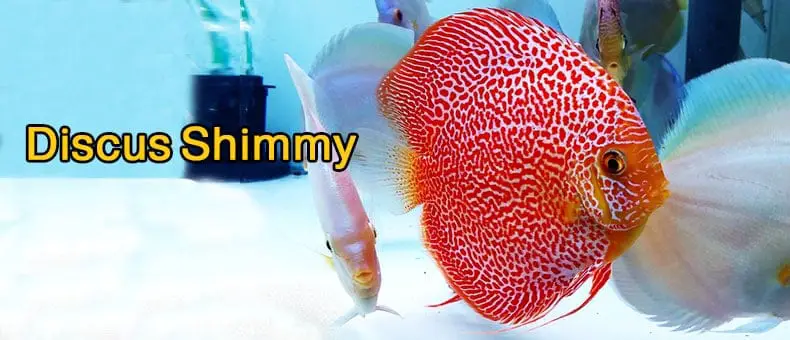
Discus Shimmy is an odd postural behavior that causes the Discus fish to twitch, vibrate, or shake their bodies at short intervals. Discus shimmying is a symptom, not exactly a disease; it can be accompanied by other symptoms, especially ones that are somehow linked with stress, unhealthy water issues, and poisoning.
Table of Contents
- Discus Shimmy Symptoms
- Discus Shimmy Details And Causes
- 10 Steps Discus Shimmy Treatment
- Discus Shimmy Future Prevention Tips
- Conclusion
From time to time, you might observe a Shaking Discus in your aquarium; this is an indication that your Discus fish has lost control over the action of its muscles and nerves. There are other behaviors associated with Discus shivering, which include clamped fins, head shaking, yawning, heavy breathing. Discus shimmy occurs with other symptoms like cloudy eyes, excessive slime production, lethargy, bloating.
Discus Shimmy Symptoms
The following are symptoms of Discus shimmy and symptoms that may accompany Discus shimmy:
- Shaking of the head.
- Shaking of the whole body.
- Heavy breathing.
- Yawning.
- Excessive slime production.
- Cloudy eyes.
- Bloating.
You may also observe some or all of the above symptoms in your shimmering fish; it will help you indicate when your fish is looking for a mate, or she is really sick.
Discus Shimmy Details And Causes
Discus shivering from time to time is known as shimmying. Discus Shimmy is a symptom not specifically a disease; Shivering in Discus can be a result of stress, poisoning, and water chemistry issues.
Coldwater effects can also cause your Discus to shiver; poor water quality can cause the Discus to shimmer because it gives rise to bacterial and protozoan diseases such as fin rot, slime disease, and mouth fungus. Poor water quality can also cause poisoning in your tank, such as copper.
Shivering Discus can also be a result of spawning behavior, but a twitching Discus is an indication that other issues are going on. You have to check your water parameters because your Discus might be stressed and observe the pH of your tank with your testing tools. If the Discus fish shiver before a spawn while they look at the exact spot where they intend to lay eggs, they ripple their bodies entirely.
Discus Shimmy Causes
There are Four causes of Discus shimmy:
- Discus Shimmy – Breeding Time.
- Discus Shimmy – Tank Domination Indication.
- Discus Shimmy – Stress Symptoms.
- Discus Shimmy – Disease Infection.
Discus Shimmy – Breeding Time
Before the spawn time watching your male and female Discus really looks nice, They may spawn for a few days or less. Every pair of Discus is different from the other. The dances are more exciting to watch. You may witness bow.
Also, This is when the Male and female face each other some distance apart near the bottom of the tank, and they both swim upwards at a 45-degree angle towards each other. When they have met, they will then proceed downward, again at a 45-degree angle, until they each occupy the others beginning position.
They will start looking for a comfortable breeding surface and begin to clean the area, both taking turns to peck at the surface. As the spawn becomes closer, they will shake as if they were shivering. When they start shaking or shivering, a spawn is drawing nearer.
Discus Shimmy – Tank Domination Indication
Discus are cichlids, and like all Cichlids are territorial and can be aggressive, especially the male Discus, the male Discus can shimmer when they are aggressive towards another Discus.
And the case is not just about removing the aggressive Discus, if the aggressive one is removed the next male Discus in the tank will take up from and become aggressive, it can go like that till you have removed all the male Discus in the tank when it’s remaining two Discus in the tank the more aggressive one can pick the other to show it’s more powerful and during this time you can observe shimmer from this Discus.
Discus Shimmy – Stress Symptoms
Discus Fish can shimmer as a result of stress, severe stress from poor water conditions, improper feeding, unstable pH, harassment from other fishes, etc. When you find your fish shaking or shimmering, then have to make sure that all these stress problems are taken care of before you suspect any disease.
Discus Shimmy – Disease Infection
When the water condition in your tank is poor and unhealthy, it can attract parasites, bacteria, and fungi into your tank, and when any of this affects your fish, it can cause a disease that might make them shimmer. An infection like swim bladder disorder can cause your fish to shimmer when your fish shimmers along with side symptoms like loss of appetite, imbalance in water, clamped fins, bloat she may be suffering from swim bladder disorder.
How To Differentiate Between Discus Pairing, Aggression, or Disease Shimmy?
[1] Discus Is Infected With An External Parasite
Your Discus fish might lose control over the action of its muscles and nerves and it can be a symptom of a disease or parasite, in this case, you might notice this shivering most of the time through many days or even weeks as long as the Discus is infected, you should also observe the Discus with other symptoms to identify the disease.
[2] Discus Pairing Behavior (How do you know if Discus is pairing?)
During the pairing and breeding process, Discus fish will always shake in pairs during reproduction.
Your Job to do as an aquarist is to separate them from a spawning tank so that the eggs and sperms will not die unnecessarily, and new fishes can be left to form in the main tank.
When your Discus fish is shimmying or shaking alone, it is most likely she wants to attract a mate, but if they are shivering and shaking as a pair, then they are ready for spawning.
[3] Discus Is Aggressive
When Discus is aggressive, you will notice that she is shivering while she challenges one or more other Discus to dominate the tank.
That is how you will be able to differentiate between Discus pairing behaviors/when it is aggressive and a disorder.
[4] Discus Is Stressed
Your Discus fish could shake or shiver as a result of severe stress, poisoning, for example, acidic poisoning, nitrite poisoning- poor water chemistry.
10 Steps Discus Shimmy Treatment
The following steps are how to treat fish shimmy:
- Quarantine the Shivering Discus in a hospital tank so you can observe properly and also separate her from other fishes that are normal.
- If the shaking Discus fishes are two, then separate them in a spawn tank because that is a Discus pairing behavior.
- If you observe any aggressive fish, do well to separate it to a smaller tank and return it after some time, and if any fish is injured or pricked by another fish separate and treat immediately so that the wound will not be infested by bacteria, Parasite or fungi.
- Feed your healthy fish diets and don’t overfeed.
- In case of any infection or disease as a result of injury from aggressive fish treat with salt bath and anti-biotics like bacteriocide two recommended by an expert, it’s sensitive to do not administer drugs on your own.
- Perform water changes of 50% daily in the Quarantine tank (in case you diagnosed the Discus with infection).
- Test water to ensure a stable pH.
- Maintain a stable temperature in tank 80-86° F.
- Start aging your water with a heater and an air stone.
- Wipe down all the sides of the aquarium.
Discus Shimmy Future Prevention Tips
- Perform regular water changes of at least 25% weekly.
- Get a testing kit, test your aquarium water once every in two weeks.
- Maintain a stable pH in your tank, do everything possible to avoid stress for your fish.
- Maintain a temperature of 86°F or 30 °C; Parasite does not like these high temperatures.
- Check all electrical equipment on a regular basis, as often as possible, Is the glass around the heater damaged, cracked or showing signs of condensation on the inside of the glass.
- Always make sure you have all the main test kits and make sure any liquid test is up to date.
- Note that high temperatures, low oxygen readings. Make sure you have plenty of air stones working in a Discus tank!
Conclusion
Discus shimmy is not so serious if you observe it in your Discus, it is a Discus pairing behaviors, and it can also be as a result of a disease or parasite in your Discus. So you need to carefully observe your Discus at least 20mins every day so you will be able to notice when your Discus is horny and when he is sick. Early attention and treatment are always better, but prevention is the best!

Question I have tried breeding Discus with different pairs, seen the males trying to fertilise the eggs but they fail .IThe eggs are grey sometimes they eat them sometimes I remove them.Is there anything I can do ,so I can at least get fertilised eggs..PH of tank 6.5 temperature 86f 300 gallon tank which is divided for breeding purpose.